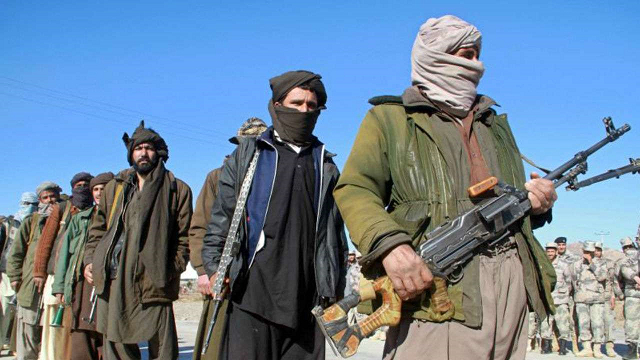A convenient kidnapping in Afghanistan
The kidnapping gives India a leverage to ensure their men have a seat at the table by solving this problem for US

PHOTO: REUTERS
Once the Indians realised that President Trump was moving ahead with signing the peace deal with the Taliban even after he put it on pause citing the death of a US soldier in September last year, they knew their options were dwindling by the minute. Right when the noise about the spread of the coronavirus was about to hit the mainstream, a kidnapping happened in Afghanistan, of a man named Mark M Frerichs. It was a month before the peace deal. He was from Lombard, Illinois. A former US Navy diver, he was the managing director of the International Logistical Support.
Amid the fanfare of the peace deal, there has been deafening silence over the fate of this 57-year-old American. Publicly, the US intelligence has said that the kidnapping appears to be the work of the Haqqani network. However, the Taliban, who are allies of the group, have denied any wrongdoing or knowledge of Frerichs’s whereabouts.
The Taliban denial was quite mind-boggling. Because if this man was in Taliban custody, that would have been their huge bargaining chip during the negotiations with Khalilzad. The Taliban have never shied away from bragging about capturing Americans and then using it for the release of their own. Furthermore, this is the sort of stuff needed for Taliban propaganda. They could have bragged about their power and reach. A recalcitrant group that continuously refuses to talk to the Kabul regime, defies American demands, and continues to create mayhem because that is their main bargaining chip would not shy away from using an American citizen in their custody as their ace of spades in these peace negotiations. But did they have that card?
Regardless, the news was designed to achieve one purpose; to derail the peace deal. An American in Taliban custody could have proved deadly for the talks. Unfortunately, New Delhi did not see its fruits and the deal did happen.
A rare article appeared in The New York Times mentioning the kidnapping only in passing. However, interestingly the article ended with these words: “Some intelligence officials believe the Haqqanis have probably moved him [Mr. Frerichs] across the border to Pakistan, and say that the closer advisers are to the border area, the more likely they are to get information.” The article is about whether or not Washington should move CIA personnel out of Afghanistan as demanded by the Taliban but then it advocates keeping some CIA personnel who could remotely support the NDS supported killing machine, the Khost Protection Force, so that they could continue the manhunt for Frerichs near the border with Pakistan.
That is the Hercule Poirot moment. This kidnapping, if ineffective in derailing the peace talks, could help India gain leverage in a future scenario. Now, the advocacy is done for the KPS to be armed to the teeth so that they can continue with their killing spree inside Afghanistan and destabilise Pakistan. It gives India a leverage to ensure their men such as Ghani and Saleh have a seat at the table by solving this problem for America using the KPS, while also having some lethal power on ground. The excuse to unleash a manhunt for the kidnapped American is too convenient and too timely.
Published in The Express Tribune, April 23rd, 2020.
Like Opinion & Editorial on Facebook, follow @ETOpEd on Twitter to receive all updates on all our daily pieces.















COMMENTS
Comments are moderated and generally will be posted if they are on-topic and not abusive.
For more information, please see our Comments FAQ